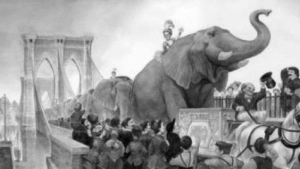Womesh Chunder Bonnerjee (W.C. Banerjee) was the first President of the Indian National Congress (INC), serving at its inaugural session in 1885. His role in the establishment of the Congress marked a significant moment in India’s history and the beginning of the political organization that would later play a pivotal role in the Indian independence movement.
Birth: Womesh Chunder Bonnerjee was born on December 29, 1844, in Calcutta (now Kolkata), India, into a prominent Bengali family.
Education: Banerjee was well-educated, having attended Presidency College in Calcutta and later studied at University of Calcutta, where he earned his degree in law. He was one of the first Indians to become a barrister in England.
Contribution to Indian Politics: W.C. Banerjee was deeply involved in the Indian social reform movement and had strong opinions on Indian rights and the political development of India under British rule. His legal background and intellectual approach helped him become an early political leader.
Formation of the Congress: The Indian National Congress (INC) was formed in 1885 with the aim of bringing Indians together to express their grievances to the British government. The idea of forming a national political organization was proposed by Allan Octavian Hume, a British civil servant, with the intention of creating a platform for dialogue between the British rulers and the Indian elite.
W.C. Banerjee as President: W.C. Banerjee was elected as the first President of the Indian National Congress at the first session held in Bombay (Mumbai) in 1885. This session was attended by 72 delegates, and though the gathering was small, it marked the beginning of what would later become the principal political force for India’s independence.
The session was more about political representation and creating awareness about Indian concerns, and it was not yet a radical body advocating for independence. However, Banerjee’s leadership symbolized the shift towards political organization and collective action.
Banerjee, during his presidency, emphasized the need for constitutional reforms and an end to discrimination against Indians by the British colonial administration. His role in the INC helped establish it as a moderate political force.
Moderate Leadership: As the first president of the INC, Banerjee’s role was largely symbolic of the early moderate phase of the Congress. He, along with other early leaders like Dadabhai Naoroji, Surendranath Banerjee, and Gopal Krishna Gokhale, believed in working within the system to achieve reforms through petitions, dialogue, and constitutional methods. The INC during this period did not advocate full independence but focused on issues like civil rights, government reforms, and the welfare of Indians.
Disillusionment with British Rule: After his initial leadership in the Congress, W.C. Banerjee became disillusioned with the British government’s unwillingness to grant significant reforms. He also faced conflicts within the Congress between the moderate and more radical factions, which would later give rise to the extremist movement in the Congress led by Bal Gangadhar Tilak and others.
Role in Indian Social Reform: Besides his political career, Banerjee was also active in social reform. He worked to promote education for women and the economic upliftment of the Indian population. He was a supporter of Indian culture, and his contributions extended to areas like literature and cultural activism.
Declining Role in Congress: Over time, Banerjee became less involved with the Indian National Congress as it moved towards more radical positions. He was critical of some of the Congress leaders who called for more direct confrontation with the British, especially after the Partition of Bengal in 1905.
Death: W.C. Banerjee died on June 23, 1906, leaving behind a legacy as the first president of the INC, and as one of the key figures in the early days of Indian political mobilization.
Foundation of Indian Political Movement: W.C. Banerjee’s leadership in the first session of the Indian National Congress laid the foundation for what would later become the principal political organization leading India’s struggle for independence. His presidency, though short-lived and primarily symbolic, marked the start of a political journey that would grow in strength and eventually challenge British colonial rule.
Moderate Ideals: Banerjee represents the moderate phase of the Congress, where the focus was on constitutional reforms, dialogue with the British government, and securing rights for Indians within the colonial framework.
Symbol of Early Nationalism: W.C. Banerjee is remembered as one of the early leaders in the Indian nationalist movement who helped shape the Indian National Congress and contributed to its eventual transformation into the major force that led to India’s independence in 1947.
W.C. Banerjee (Womesh Chunder Bonnerjee) was the first President of the Indian National Congress (INC), elected at its inaugural session in 1885. Though his tenure as president was largely symbolic, he played a pivotal role in shaping the early direction of the Congress. He advocated for political representation, constitutional reforms, and the welfare of Indians under British rule. Banerjee’s leadership marked the beginning of organized political efforts in India, which ultimately laid the groundwork for the country’s freedom struggle.







